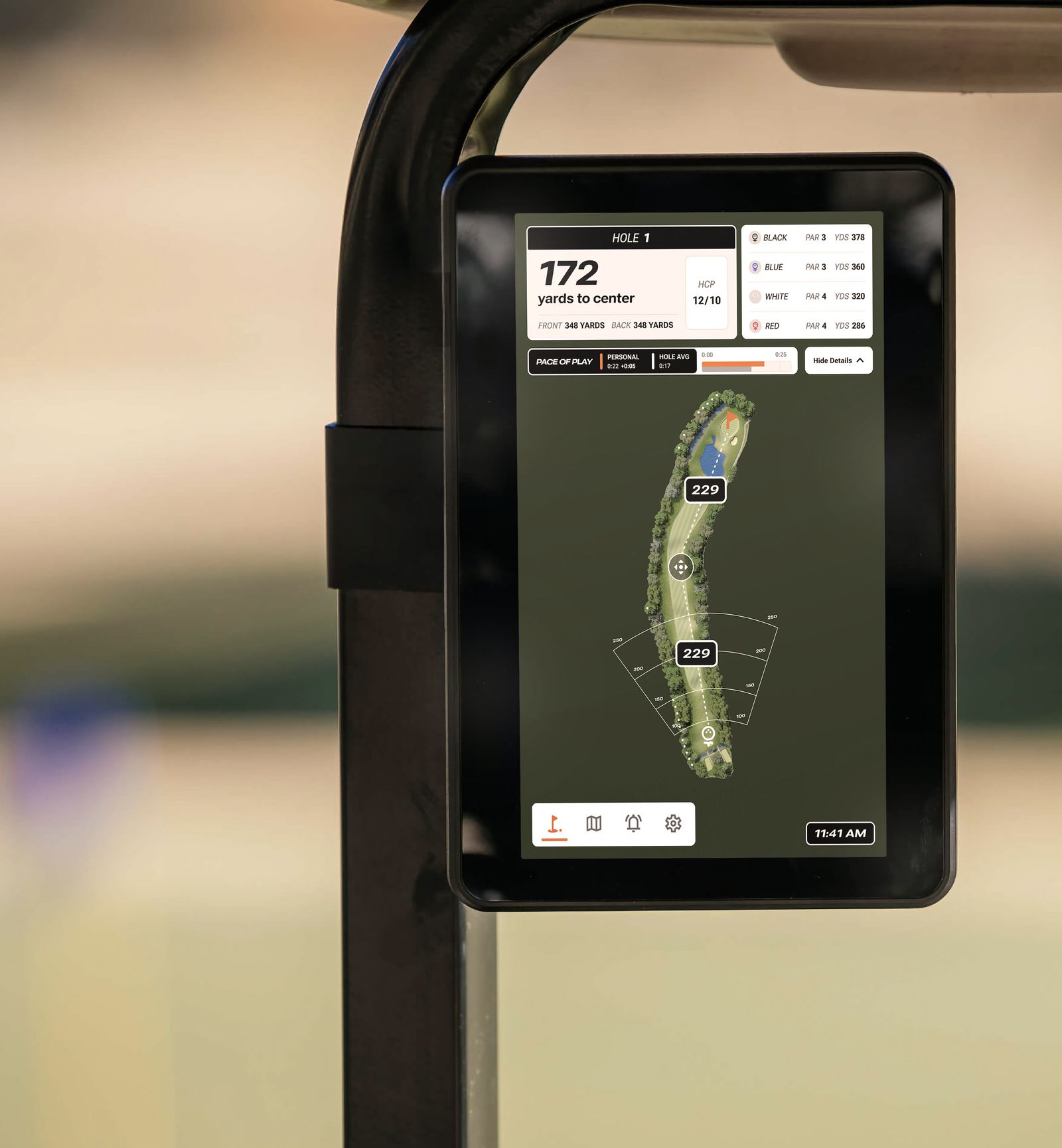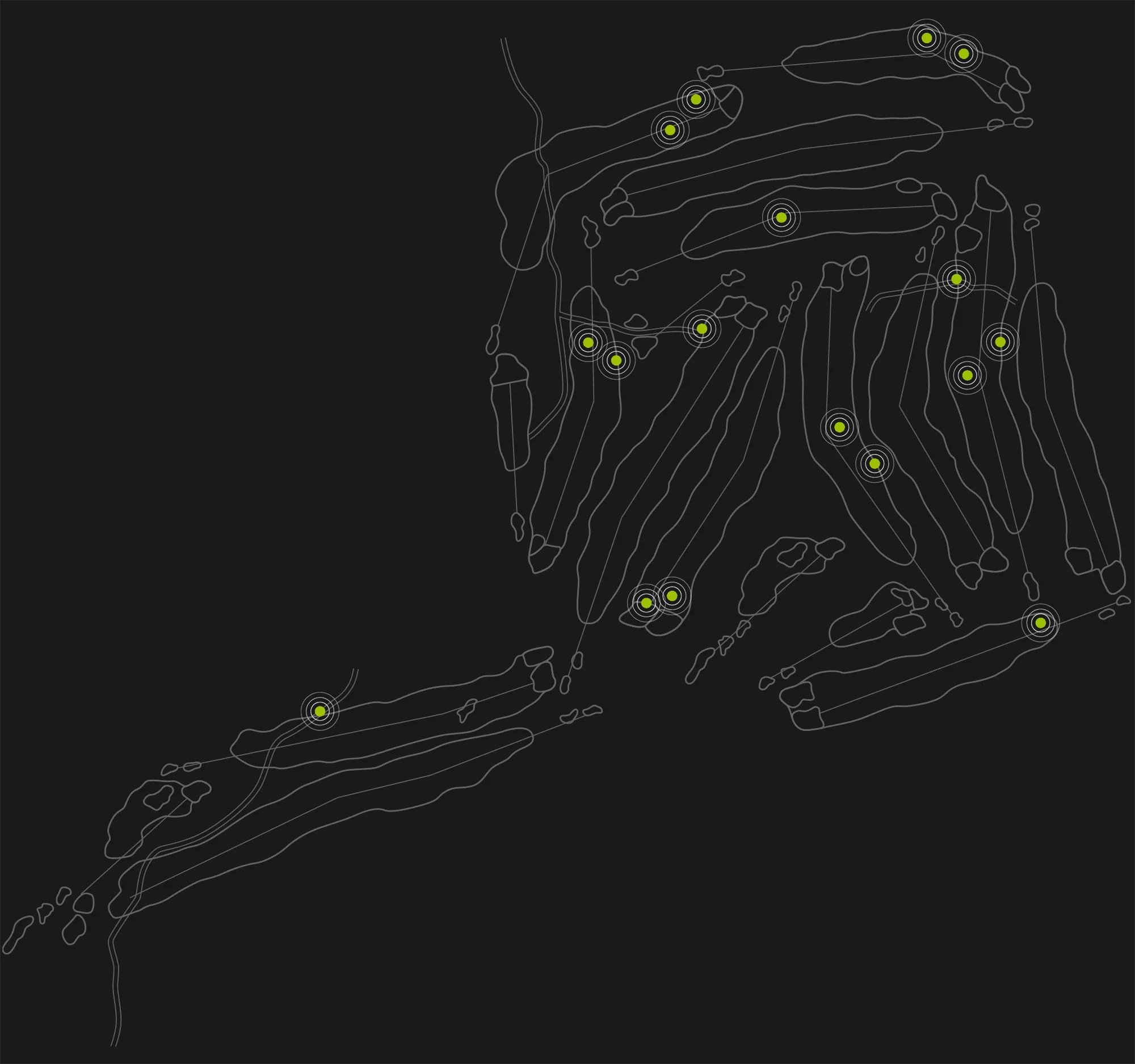Introduction
Welcome to the future of golf operations, where technology is used by marshals to enhance the player experience and streamline the management of the golf course.
In today's competitive golf industry, marshals play a crucial role in ensuring smooth play, protecting the turf from excessive cart traffic, and delivering an exceptional player experience. However, they face significant challenges in managing golf operations efficiently.
Much like other industries have done, the golfing world is discovering the immense potential of merging human touch with technological advancements, such as data and analytics generated from golf cart GPS systems.
This article delves into the transformative power of integrating technology with marshal management in golf operations, drawing key insights from other industries and highlighting the symbiotic relationship between marshals and technology.
The Success of Combining Technology with People in Other Industries
The hotel and airline industries have effectively combined technology with human interaction to surpass customer expectations.
Instead of replacing humans with machines, these industries have employed technology to optimize experiences through people. By automating certain processes, customer service agents are freed up to focus on creating personalized interactions. Meanwhile, the technology collects data and tracks patterns, allowing businesses to better serve their customers.
While technology has its advantages, it cannot replace the warmth and empathy that a human service representative can offer.
A true customer experience is one that combines the best of both worlds and the hospitality industry has certainly benefited through improved customer experience and lower costs.
The Traditional Role of Golf Course Marshals and Challenges
The traditional role of golf course marshals has long been one of monitoring pace of play, making sure carts don't go into areas they don't belong, and addressing any issues that may arise.
However, with the challenges of driving around in search of these issues, marshals can often become inefficient in their efforts.
Without data-focused conversations to guide their actions, it can be difficult for marshals to accurately assess a situation and determine the appropriate course of action. Additionally, confrontational interactions with players can further erode the overall player experience and impact loyalty.
Implications to the Player Experience
As golf continues to thrive, so do the challenges in delivering a quality player experience, especially when it comes to confrontations with golf course rangers.
Performing a Google search will unveil amusing and occasionally worrisome videos showcasing interactions between rangers and players.
A major challenge is the lack of data-focused conversations, as many marshals inefficiently rely on personal observation and hearsay to assess players' pace of play, leading to false assertions and interactions with players about slow pace. This erodes the player experience, as players may feel unjustly singled out or hurried.
Properly utilizing data, such as tracking the time it takes a group to complete a round or utilizing GPS technology, can lead to more fair and accurate assessments of pace of play and improve the interactions between players and rangers, ultimately leading to a more enjoyable golfing experience for all.
Negative Reviews Have a Detrimental Effect on Public Golf Courses' Business
In today's digital age, public players often rely on online reviews to choose where to play. A series of negative comments, particularly those mentioning poor pace of play, player experience, or confrontations with marshals, can deter new customers and lead to a decline in bookings.
Expectations are High at Private Clubs Challenge Reputation
Private club members are a discerning group, with high expectations when it comes to their golfing experience. While some may prefer to play at a quicker pace, it is important to note that not all golfers are created equal. In fact, some may feel they are being unfairly labeled as "slow" despite playing at a reasonable and acceptable speed.
Such situations can create a challenging environment for golf professional staff to manage, particularly without concrete data to support their actions.
By understanding the dynamics of the private club world and the diverse expectations of its members, golf professionals can use data to strike a delicate balance between meeting those expectations and ensuring a fair and enjoyable experience for all.
Rules of Thumb are Not Dependable.
One of the most challenging aspects of golf is managing pace during a round and not after the round.
While some golf courses have attempted to address this issue by putting clocks out on the course or posting time-by-hole expectations in the golf cart, these solutions have proven to be inefficient.
There are several reasons for this, including the fact that not all players are able to see the clock or notice the posted times, particularly if they are focused on their game. Additionally, the times posted may not be accurate depending on the pace of play and the number of players on the course at a given time.
While it is important for golfers to manage their time during a round, a more effective solution to this issue may be arming trained course marshals with data to monitor pace of play and keep players moving efficiently.
Players Behave Better When Monitored
With humans being unpredictable in their behavior, it is essential to keep a watchful eye on their actions.
While rangers on the golf course serve as a critical tool in this regard, it is impossible for them to be everywhere at once. It is where technology comes into play as it offers an extra layer of monitoring to ensure that everyone on the golf course is exhibiting the appropriate behavior.
The fusion of technology and human expertise presents a formidable strategy in this context.
Overall, while ranger presence may not be feasible in every spot on a golf course, technological monitoring provides a necessary alternative that can help maintain the course's operational efficiency and enrich the players' experiences.
The Financial Consequences of Inefficiency
The need for labor is a constant challenge for golf courses. Furthermore, driving around hundreds of acres to search for problems on the course can compound the issue, as it can be a time-consuming and inefficient process.
In order to address these challenges, golf courses should consider adopting the cost-saving approach utilized by airlines and hotels alike: automation and data.
By leveraging technology, golf courses can augment their human resources while reducing labor costs. Through automation, data analytics, and other technological solutions, golf courses can streamline many of their processes and operate more efficiently saving up to 33% on labor costs.
This approach can also improve the experience of golfers by enabling courses to more effectively anticipate and address potential issues, ultimately leading to a more enjoyable and profitable operation overall.
Managing a Golf Course Can Be Financially Challenging
Managing a golf course can be financially challenging and requires a great deal of skill and expertise.
As a golf course manager, it is important to have a deep understanding of the industry and keep up with the latest trends and best practices in order to ensure the financial viability of the course.
With the right strategy and approach, however, it is possible to run a successful and profitable golf course that delivers a world-class experience to golfers while also meeting the demands of the industry.
Choose Technology Over Paper Every Time
Golf courses can benefit financially in significant ways by utilizing technology in their operations. As other industries have already shown, advancements in technology can bring about cost savings and improved efficiency.
By implementing software and hardware solutions that streamline operations, golf courses can reduce overhead costs and allocate resources more effectively. This can result in savings of up to 25% and a boost to the bottom line.
Additionally, technology can improve the experience for golfers by providing real-time updates on course conditions and proactively addressing maintenance concerns. With these advantages within reach, golf courses should consider integrating technology into their operations to maximize their financial potential.
A Modern Take on Managing Everything that Moves on the Golf Course
As technology continues to advance, it's becoming more apparent that the traditional GPS systems offered by golf cart companies simply aren't cutting it anymore.
Golfer professionals and course operators alike are seeking out more sophisticated systems that can provide insights, analytics, and automation to streamline their operations and maintenance efforts. By relying on data-driven tools, operators can identify areas for improvement and make more strategic decisions.
Data-driven tools can be transformative in the hands of golf course rangers. Primarily, these tools help in significant ways.
Manage Walkers and Caddies
For golf courses aiming to provide the optimal experience for both golfers and staff, traditional GPS systems offered by cart companies fall short in managing walkers and caddies.
Without the ability to monitor these rounds, golf course operators can’t get a full view of the golf course and provide optimal service for all players.
A comprehensive golf cart GPS is the solution to this problem. It allows course management to easily track and manage all players on the course, ensuring a consistent and enjoyable experience for all parties involved.
Proactive Pace of Play Management
Leveraging data and processes to accurately assess and manage the pace of play, eliminating the reliance on subjective observations. This ultimately leads to fairer and more accurate decisions and less confrontational interactions, enhancing the player experience. Pace is managed proactively before the issue becomes too big to solve.
At private Clubs, this results in an improvement of pace by an average of 15 minutes and predictable rounds for members, even during busy times.
For public courses, proactive pace of play management can add eight tee times per week, increasing revenue.
Identification of Problematic Players Holding Other Players Up
With advanced GPS systems like FAIRWAYIQ marshals know which groups are out of position and behind pace.
This data ensures that the ranger addresses the appropriate group, who can actually do something about improving flow, not groups that are hampered by the groups ahead of them.
This removed the friction from the typical rangering process.
Data-focused Conversations
Data can provide invaluable insights into course flow, cart travel paths, and other common issues like turn times.
Rangers can use this information to manage the course more effectively, leading to improved flow and customer satisfaction.
Governance at Private Clubs
Golf committees can use the data insights from advanced GPS systems as input to their existing governance practices in managing pace of play and protecting the turf from cart traffic.
There is no substitution for the availability of accurate and timely data.
Increasing Revenue at Public Golf Courses
Public golf courses face a constant challenge in balancing revenue and player experience. However, with advancements in technology, course operators now have the opportunity to deliver on both by optimizing group spacing.
Historical data that has tracked every round is a key tool in determining the appropriate group spacing for a course. By using this data, operators can find the sweet spot between golfers' enjoyment of their game and ensuring the course is still able to generate profit.
Although it's a challenge to strike the right balance, modern technology provides tools to help course operators achieve success and make every golf outing a win-win for everyone.
The Perfect Match: Technology and Marshals Working Together
The role of a ranger on a golf course has evolved with the arrival of technology.
Rather than being replaced, rangers are now being augmented with the latest data and technology-enabled processes to improve their effectiveness.
The idea of a host at a restaurant attempting to manage table turnover by observing guests and allocating tables without technology seems almost comical. Restaurant employees were not replaced by technology, they were made more efficient with it and one cannot imagine a restaurant without it.
The same can be said for a ranger attempting to manage a golf course by line of sight alone. With the aid of technology, rangers are now able to streamline operations, monitor pace of play, and better manage course traffic. This evolution in the role of the ranger is a win-win for golfers and course owners alike, as everyone benefits from a more efficient and enjoyable golfing experience.
Real-time Notifications Ensure Marshals Focus on Solving the Right Problems
By using technology as a digital operating system for the golf course, marshals are made aware of any issues that require their attention, allowing them to focus on providing an exceptional experience for each golfer.
The beauty of this approach lies in the combination of people and technology that creates a seamless and efficient system.
As a result, golf course managers can handle issues quickly, ensuring the smooth running of the course. The use of technology as a digital operating system is sure to become even more widespread as golf courses look to maintain a competitive edge while reducing costs.
Summary
In summary, the integration of advanced golf cart GPS systems with the traditional roles of golf course marshals can create an effective, data-driven approach to golf course management.
This combination allows for proactive management of pace of play, efficient monitoring of all players, identification of problematic players, and the generation of valuable data insights to inform strategic decisions.
This approach not only enhances the player experience by ensuring smoother course operations but also increases revenue potential for public courses. Moreover, the use of real-time notifications keeps marshals informed and focused on addressing the right issues, further improving course efficiency.
The future of golf course management is undoubtedly a harmonious blend of technology and human intervention.
Related Posts

Why Your Course Needs More Than Just GPS: Our Pace of Play Bible, Summarized

Choosing the Right Golf Cart for your Course: Models Compared

Enhance Your Game: The Top Benefits of a Golf Cart Screen on the Course
Revolutionize Your Golf Operations with FAIRWAYiQ
Unlock the power of data analytics to optimize your golf course management

